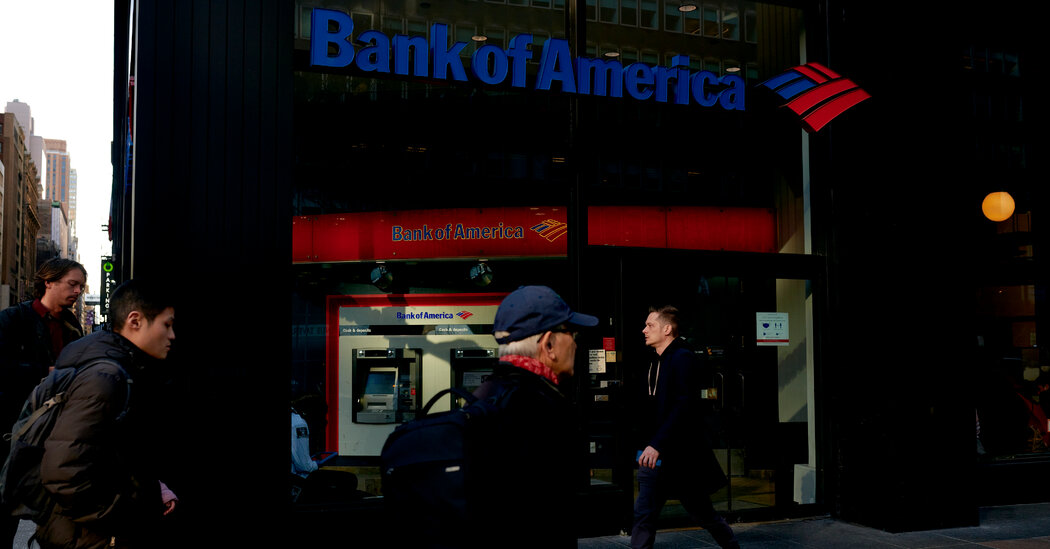Bank of America withheld promised perks from some of its credit card customers, charged duplicate overdraft fees and secretly opened card accounts in customers’ names without their knowledge or consent, federal regulators said Tuesday.
The Office of the Comptroller of the Currency and the Consumer Financial Protection Bureau, which oversee the banking sector, imposed $150 million in fines on the nation’s second-largest bank for what they called “junk fees” it charged. charged customers. mishandling customer accounts. Some customers paid $35 in overdraft fees multiple times for a single transaction they requested from an account with insufficient funds.
As part of the consumer agency’s action, the bank will refund more than $80 million to customers who were falsely charged or denied signup bonuses, and compensate customers who had cards opened in their name without their knowledge.
The practices came to light as part of an industry-wide investigation, commissioned by President Biden in 2022, into the fees companies charged customers. Bank of America ended the practices described in Tuesday’s actions in 2021 and 2022, according to regulators.
“These practices are illegal and undermine customer confidence,” Rohit Chopra, the consumer agency’s director, said in a statement. “The CFPB will end these practices throughout the banking system.”
Regulators said Bank of America imposed improper overdrafts by charging customers twice for the same transaction. The first charge is a $35 “insufficient funds” fine imposed on a customer who attempts to pay for something by check or automated transaction without having the necessary funds. The transaction would be declined, but if the merchant trying to collect the money requested payment again, the money would be processed and another $35 would be charged to the customer’s account, this time as an overdraft , or it would be declined again, pay a second “insufficient balance” fee.
A Bank of America spokesperson said that in early 2022, the bank had “voluntarily” reduced overdraft fees from $35 to $10 and removed the $35 “insufficient balance” penalty. Since then, revenue from such fees has fallen by 90 percent, the spokesman said.
In addition to the overdraft action taken jointly by the two regulators, the consumer agency said it had discovered two other areas where the bank mistreated customers. For some customers tempted to open new credit card accounts, the agency found that Bank of America had not provided the sign-up bonuses it had promised to customers who opened accounts over the phone or in person instead of online.
The agency also said it had uncovered some cases of Bank of America employees opening new cards in customers’ names without their knowledge or consent to meet sales targets.
These counterfeit bills seemed to make up only “a small percentage” of Bank of America’s new bills, according to the consumer bureau. By comparison, such practices were rampant at Wells Fargo, prompting years of investigations by federal and state authorities that resulted in billions of dollars in fines.
The regulators’ actions represent an important move against a single institution over junk fees, but not the biggest. In December, the consumer agency filed its largest-ever lawsuit against a bank with a $3.7 billion case against Wells Fargo for such fees. In September, the agency directed Regiobank, a medium-sized lender, to deposit $50 million into an emergency fund for victims and repay its clients $141 million in overdrafts.
The banking industry has been trying lately to avoid imposing regulatory action against customer fees. Several of the largest US banks announced changes to their overdraft policies in late 2021 and early 2022. Trade groups later argued that the changes made by the banks themselves meant that no new overdraft laws or regulations were needed.
“These reforms of the nation’s largest banks have taken place without regulatory or legislative intervention and collectively represent a transformative moment in time for the industry,” Lindsey Johnson, the president of the Consumer Bankers Association, a lobbying group, wrote in a statement. opinion piece in September. .

